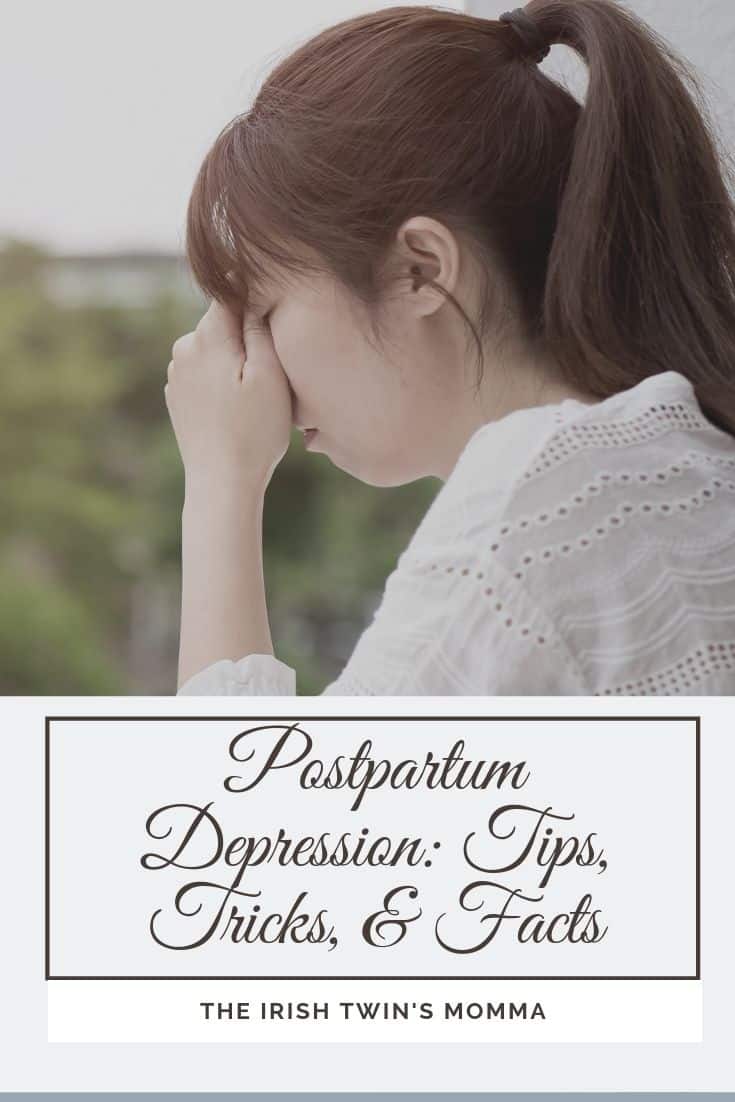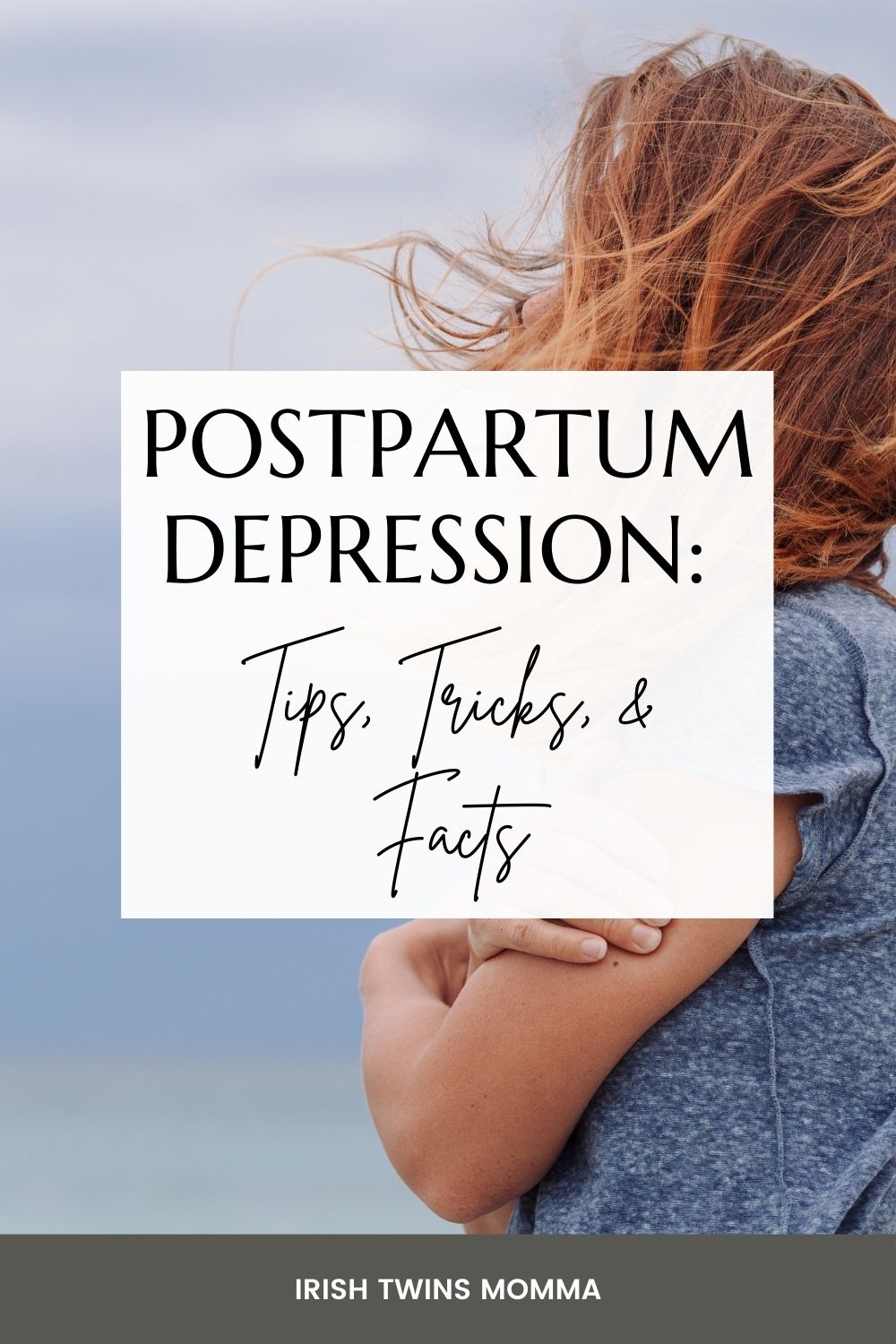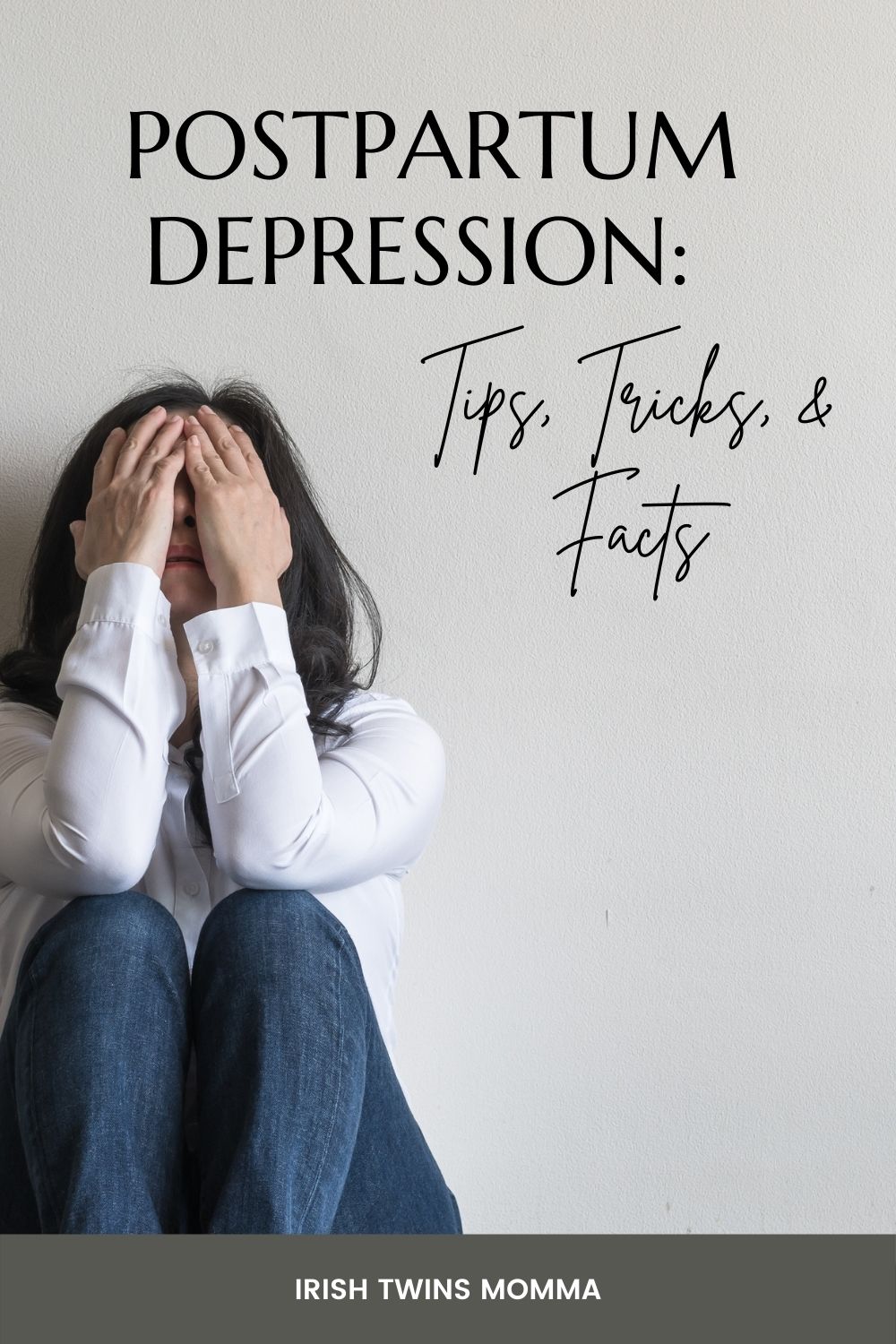This post contains affiliate links. If you click and buy, I may make a commission, at no cost to you. See my disclosure policy for more information.
Postpartum depression is a common mood disorder that affects around 1 in 7 women following childbirth.
Proper treatment from a physician is greatly encouraged.
**This post is not to give medical advice, however, this condition should be treated and monitored by a medical professional.**
FACTS ABOUT POSTPARTUM DEPRESSION:
Women with postpartum depression often feel sad with the inability to care for themselves or their families. They may feel anxiety and exhaustion that make it difficult for them to complete the day-to-day routine.
There is no definitive cause and it is no one’s fault. Everyone’s situation and symptoms can be completely different. The likely cause is related to the levels of hormones that quickly drop following childbirth, which results in rapid chemical changes in the brain.
Often moms are unable to get the adequate rest they need following delivery due to discomfort and exhaustion which can contribute to depression. Delivering a baby is no walk in the park. It takes a lot out of you and your body needs rest in order to recover properly.
COMMON SYMPTOMS OF POSTPARTUM DEPRESSION:
These are some of the common symptoms that I know about. There is more so if you are feeling any of these speak with a medical professional in order to determine the best treatment.
- Sad, hopeless, or overwhelmed
- Crying often or for no apparent reason
- Worrying or feeling overly anxious
- Feeling moody or irritable
- Oversleeping, or being unable to sleep when the baby is sleeping
- Trouble concentrating or making decisions
- Experiencing anger or rage
- Losing interest in activities that were once enjoyed
- Suffering from physical aches and pains
- Eating too little or too much
- Withdrawing from friends and family
- Difficulty bonding or forming an emotional attachment to her baby
- Persistently doubting her ability to care for her baby
- Thinking of harming herself or the baby
**This post is not to give medical advice, however, this condition should be treated and monitored by a medical professional.**
RISK FACTORS:
There are some common risk factors that make women at a higher risk of developing postpartum depression.
- Symptoms of depression prior, during, or after previous pregnancies
- A family member has been diagnosed with depression or other mental illness (ex. bipolar)
- Medical complications or illnesses
- A stressful event during pregnancy or shortly after giving birth
- Lack of emotional support
TREATMENT OPTIONS:
- Counseling such as a counselor, therapist, psychologist, psychiatrist, or social worker.
- Medication such as antidepressants.
PERSONAL EXPERIENCE TIPS:
- You are not alone, and no two people are the same. Go to the doctor and get a medical opinion.
- You don’t have to just take one opinion. You can go see another if you want a second opinion.
- Take walks if the sun is shining. It will help you physically and mentally.
- Ask even a neighbor to walk with you in the evening. It’s amazing what fresh air can do.
- Eat healthy and well-balanced meals.
- Speak to close friends and never be afraid to ask for help.
PERSONAL STORY:
I suffered from postpartum depression and getting out of bed was tough with a toddler and newborn. It hit me really hard after Luke was born. Somedays I felt like all I was doing was making them miserable and making them cry.
I was doing my absolute best though now that I look back on it. I went and saw my OB a few weeks after being home because I was to the point I needed help or I was ready to leave.
Jack would cry because Luke was getting attention or because he wanted someone to play with. The only way I got my sanity back was by taking walks. Often times the kids would just layback and take in the fresh air.
Sometimes we got home with a missing blanket that got thrown out of the stroller or that both boys were fast asleep. I would just roll the stroller right into the living room so I could shower, clean the kitchen, or switch over the wash while I had some quiet time to myself.
Sincerely,
HELPLINES
- National Suicide Prevention Lifeline
- 1-800-SUICIDE (1-800-784-2433)
- 1-800-273-TALK (1-800-273-8255)
- http://suicidepreventionlifeline.org/
- Crisis & Warm Lines:
- 1-800-PPD-MOMS (1-800-773-6667)
- postpartumstress.com
If you would like to read more about postpartum depression please see the following:





Fancy
It is tough and everyone feels alone in it.
irishtwins16
I completely agree. I wish there was a way to help mom’s know they aren’t alone more.
Dipti Shah
Not gone through it but can empathise
Susan
This is such an important article! Thank you for writing it! People don’t seem to understand it is an actual physiological thing….not an emotional thing…thanks for breaking that down early on in the article! And, if not treated, it can last for years….yall are not alone people! Talk to someone like she said…there is help…there is hope! Hugs and blessings!
Ariana
Great informational post, it is so misunderstood and often swept under the rug. People seem to think because they haven’t felt it, or witnessed anything, therefore, its not real. But women live in fear of telling anyone so they keep it hidden the best they can and it’s so widespread it’s terrifying! Thanks for raising awareness!
Britt
Far too often postpartum depression is brushed off as being just ‘sadness’ or something less important than an actual mental condition, which prevents women from feeling comfortable seeking the help they need. This is why it’s so important for this conversation to happen, so thank you for bringing this topic back into the spotlight.
Berry's Poetry Book Reviews
Thank you so much for sharing your story! When I had a miscarriage I experienced what seemed (from what I read) symptoms similar to postpartum so I’ve been jumping on whatever info I can find.
irishtwins16
I read a lot at first before I realized I need to go to the doctor for help. It is very normal for women and even men to go through it. I just don’t understand why society has such a bad stigma with it. I guess that could be a post and research project of its own.
Claire
Having a baby is so tough on our bodies and on our minds, the important bit is knowing when we need to ask for help and accepting that.
Thank you for sharing your experiences with us x
Lauren
I went through this. Postpartum depression is very real. And having the support you need is really important. More parents should be educated on this, because many are unaware of how common it is. Thank you, for sharing your story.❤️
Trish
Thanks for this. I feel like postpartum depression isn’t taken serious. I think that new moms should see their doctors before six weeks!
Tamara | The Gutz Life
Great information. I hope that by consistently sharing information like this, we can work towards ending the stigma.